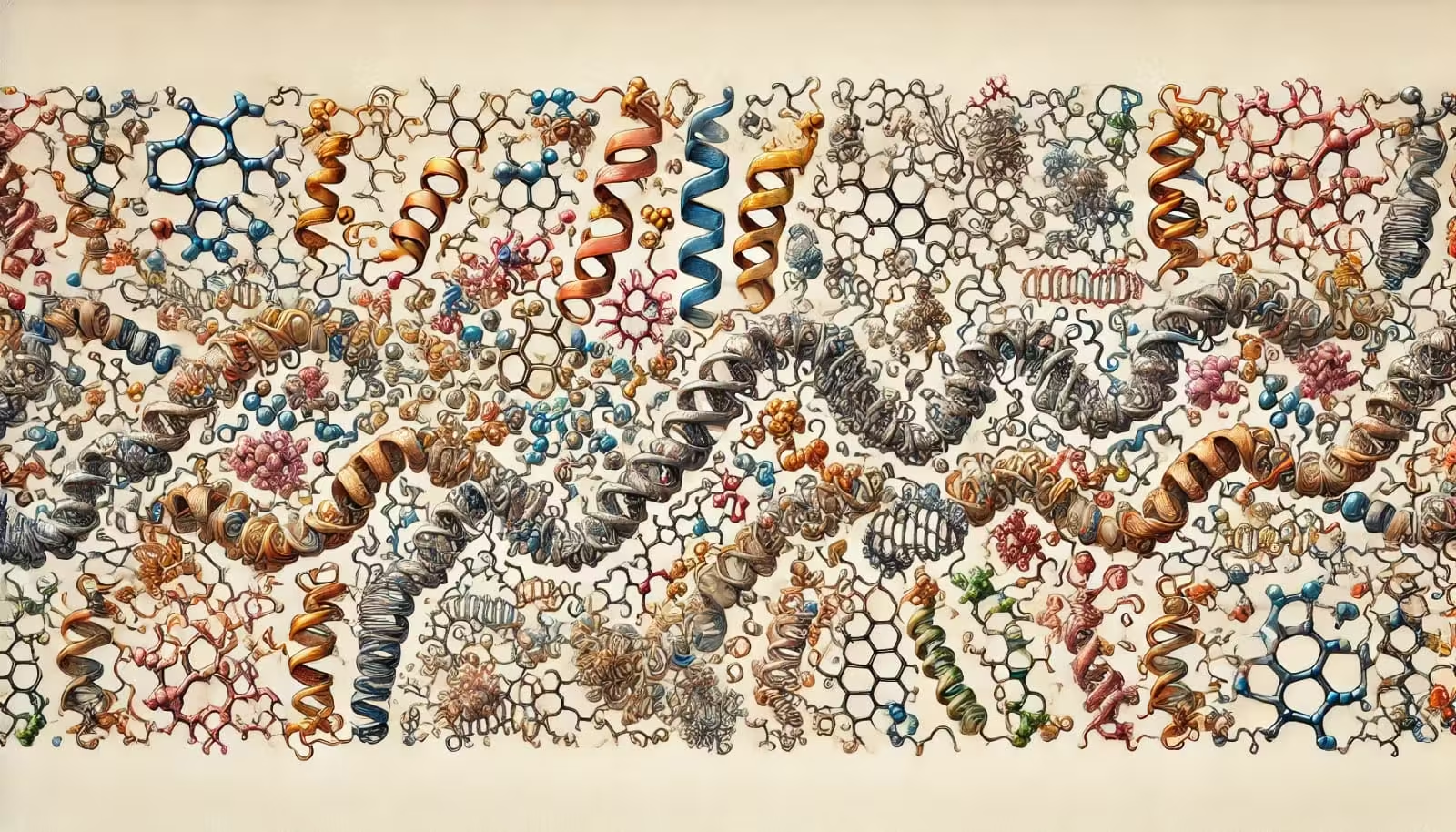Table of Contents
Peptides
Peptides are short chains of amino acids linked together by peptide bonds, typically containing 2 to 50 amino acids. They play an important role in numerous biological processes and perform differently within the human body. In doing so, they may act as hormones, such as insulin, which controls one’s blood sugar levels, neurotransmitters, like endorphins, that alleviate pain and enhance feelings of well-being and signaling molecules, like growth factors, that influence the growth and repair of cells. Since their specific action, peptides are studied for different purposes of therapy: hormone replacement therapy, anti-aging, and weight management. The specificity of peptides as such makes them useful in medical research and treatment modalities designed to address some health conditions.
Do they help in Weight Loss
Peptides are short chains of amino acids that work in the body to manage metabolic functions as well as to control the way people take meals. Though peptides have been suggested to play a certain role in losing weight, they arrive in different versions, and all of them may not result in managing weight, because some of them do while others don’t. Just like drugs, there are several peptides, and only some of them assist in managing weight loss.
Such peptides, that are ideal for losing body weight, act generally by slowing the movement of food in the gut. They may work in further magnifying feelings of fullness and decreasing the intensity of cravings for subsequent bites. By influencing these biological processes, they might manage the appetite of an individual and eventually lead to possible loss of weight. However, such treatment with these peptides should be approached with serious consideration and discussion with the medical professionals before the individuals treated with them realize their appropriateness and efficacy for the purpose.
Best Peptides for Weight Loss

Here is a more informal definition of peptides for weight loss:
Hormone-Releasing Peptides-Growth Hormones (GHRPs)
GHRP-6 Ipamorelin Mechanism of Action: Stimulates the release of growth hormone. For fat metabolism, it can enhance the rate and it preserves lean body muscle mass.
Glucagon-Like Peptides (GLPs)
Examples:
Semaglutide. It is sold under the brand name Ozempic for type 2 diabetes and Wegovy for weight loss. It is a GLP-1 receptor agonist. It enhances glucose control, slows the rate of gastric emptying, and consequently slows hunger.
Liraglutide: Now marketed as Saxenda for weight loss. Like Semaglutide, it is a GLP-1 receptor agonist that facilitates control of appetite and weight.
Dual GLP-1/GIP Receptor Agonists
Tirzepatide: Also known as Mounjaro in the treatment of type 2 diabetes, and Zepbound in the treatment of weight loss. This peptide exerts action at both the GLP-1 and GIP receptors, affecting glucose metabolism and appetite.
Melanocortin Peptides
Examples: Melanotan II and α-MSH (alpha melanocyte stimulating hormone)
How They Work: These peptides target the specific receptors in the brain that help regulate appetite, and energy expenditure.
Adipotide
How It Works: This peptide selectively kills the fat cells and reduces the fat mass, thus aiding in weight loss.
These peptides perform various functions in controlling hunger, increasing metabolism, and burning the fat; therefore, you end up losing the weight efficiently. Always consult your physician to ensure they are safe and appropriate for you.
Oral Peptides For Weight Loss
The oral peptides are designed for oral intake instead of injection and deliver administrations in a more convenient way. They could survive digestion inside the human body by being encased in a protective layer or special delivery system that enhances stability and absorption. They are hormones that mimic only the natural hormones or target specific receptors in the body to govern processes related to appetite and metabolism. Oral peptides are considered to have the advantage of easier administration with improved compliance by patients, but they have problems like effective absorption and stability in the digestive tract.
Research in this area is still going on to solve these problems. Therefore, oral peptides are a promising but constantly changing area in peptide therapy. Here is the list of oral peptides:
- Oral Semaglutide Brand Name: Rybelsus This is a member of the class of drugs called GLP-1 receptor agonists. It promotes release of insulin, delays gastric emptying, decreases appetite, and results in weight loss.
- Oral Liraglutide. Brand Name: Saxenda (injections) and Victoza (injections)
Note: Though liraglutide is available mainly as an injectable, much research is going on regarding oral formulations. At present, Saxenda and Victoza are injectable GLP-1 receptor agonists which support appetite regulation and weight management. - Oral Tirzepetide
Note: Only available as an injectable currently – Mounjaro for diabetes and Zepbound for weight loss. Research in ongoing on the possibility of oral formulation; No oral versions are present in the market as of today. - Oral CJC-1295
Note: Most preparation of CJC-1295 is injectable peptide that causes the secretion of growth hormone. Researchers have been testing oral formulations but its efficacy and availability in this area are still under research. - Oral Melanotan II
Note: Despite the fact that Melanotan II has been reported to affect appetite it is more administered through injection. The oral preparations are scarce and may not be so effective as there is an issue with their absorption.
How to use Peptides for Weight Loss

- Effective peptides for weight loss:
- Consult a Health Care Professional: You will be assessed medically and prescribed the peptides to ensure that you are allowed to use them.
- Right Selection of Peptide: Select a peptide that represents your goal: either it suppresses your appetite or boosts your metabolism.
- Following the Dosage Instructions: This includes the amount of dosage, and when you are supposed to take the dosage as directed.
- Weight and any other health-related changes: Keep track of changes and report to your provider as necessary.
- Use with Lifestyle Changes: Use peptides with proper diet and consistent exercise for best results.
- Report Adverse Effects: Provide your doctor with reports of adverse effects.
- Schedule Follow-Ups: You have to return for check-ups to monitor progress and make adjustments when need be.
Benefits of Peptides for Weight Loss
- The advantages of peptides for weight loss abound, and they are essentially due to the action in changing several biological processes. Some key advantages include the following:
- Appetite Regulation: In addition to these peptides for hunger loss, they suppress appetite and eliminate hunger pangs through their effect on hunger-regulating hormones and prevent excessive food intake.
- Metabolic Boost : GHRPs would stimulate a release of growth hormone that would stimulate metabolism and burn off fat.
- Increased Fat Breakdown: Adipotide and many other peptides specifically target the fat cells by making them break down their stored fat, leading to decreased body fat in general.
- Muscle Preservation: Some peptides help preserve one’s hard-earned lean muscles while allowing him to lose fat for the improvement of body composition and metabolism.
- Improved Blood Sugar Regulation: GLP-1 receptor agonists normalize blood sugar levels, decelerate gastric emptying, and thereby assist to lose weight and decrease appetite.
- Convenient Administration: Non-invasive oral peptide administration instead of intravenous injection, hence convenient to administer and easier.
- Supports Lifestyle Intervention: In combination with diet and exercise, the peptides can synergistically enhance weight loss and bring about far greater results.
These benefits make peptides useful for managing weight loss. Their use should be done under the auspices of the healthcare providers to ensure that the benefits are coupled with safe and effective administration.

Side Effects of Peptides for Weight Loss
Peptides can help in the reduction of body weight, but they can cause some side effects, also. The following are the most commonly reported side effects caused by the intake of peptides:
- Gastrointestinal Disturbances: GLP-1 receptor agonists and other mixed groups of peptides tend to cause nausea, vomiting, diarrhea, or constipation due to abnormal gastrointestinal motility.
- Injection Site Adverse Reactions: Injection site reactions with the injectable peptides include redness, swelling, or pain at the site of injection.
- Headaches: Some peptides may lead to a headache that begins as a mild issue but can evolve into severe headaches in other cases.
- Fatigue: Individuals undergoing peptide therapy, are likely to feel tired and fatigue, especially at first when starting.
- Hormonal Imbalance: The hormonal levels of some peptides, such as those that stimulate, the secretion of growth hormone, can cause hormonal imbalances potentially impacting other functions of the body.
- Blood Sugar Level Fluctuations: Drugs that interact with insulin or glucose can lead to fluctuations, of blood sugar level especially for diabetic and prediabetic subjects.
- Allergic Reactions: These are few, but some may experience allergic reactions, ranging from rashes and itchiness to severe occurrences.
- Overuse Effects: Some peptides cause adverse effects when used for a long time or in excess, such as joint pains or carpal tunnel syndrome, among others.
- Site Injection Infections Infection can occur if the peptide is sourced from a contaminated source and/or if injections are administered incorrectly.
It will be wise to consult a doctor before starting peptide therapy so that the patient may know the risks associated with it, and proper implementation will be conducted in such a manner that there are no side effects; medical attention may then prevent issues that the side effects may bring.
Peptides for Weight Loss and Muscle Gain
Peptides are overall positive agents for either weight loss or muscle gain, due to the varied body composition as well as metabolic alterations induced by them. Here is how they work on those functions:
Peptides for Weight Loss
- Appetite Control: Some of the peptides, such as GLP-1 receptor agonists, would include drugs like Semaglutide. These suppress appetite and increase feelings of satiety to reduce caloric intake and hence lead to weight loss.
- Breaking Down Fat. There are such peptides that target and break down fat cells, thus removing the whole fat mass and allowing the weight loss.
- Increasing Metabolism. Growth Hormone-Releasing Peptides (GHRPs) stimulate growth hormones which, in turn increase the metabolism to raise the rate at which fat is burnt.
Muscle-building Peptides
- Muscle Preservation and Growth: GHRPs, such as Growth Hormone-Releasing Peptides and CJC-1295, stimulate the release of growth hormone, which will trigger the muscle proteins to synthesize, repair damaged muscles, and overall better musculature building.
- Improved Recovery: Other peptides help through mitigating muscle damage and inflammation, which are factors that can lead to even more productive training and subsequent muscle growth.
- Better Performance: The peptides will enhance the physical performance and endurance thus enhancing muscle gain indirectly by providing an opportunity to workout intensively and frequently.
Benefits Combined
When the two types of peptides are combined then, they would help in attaining balanced body composition as follows:
- Balanced Body Composition The weight loss and the gain peptides enable the person to reduce the fat while preserving or building up the lean muscle mass around the body; hence one experiences improved body composition in all respects.
- Synergistic Effects: Weight loss peptides may reduce excess fat, while muscle-building peptides ensure that the muscle mass is either preserved or enhanced to bring about more definition and muscularity.
Considerations
- Medical Monitoring: Weight loss and muscle gain therapies with peptides should be attended to by a medical expert in order to actualize their efficacy and minimize risks.
- LIFELONG Lifestyle Incorporation: These peptides can be taken with a healthy diet and an active regime of workout that has been tailored to meet the best fitness and health goals.
Stacking peptides for weight loss and muscle gain is very efficient, but people should not attempt to do so without careful planning and professional advice.
Best Collagen Peptides for Weight Loss
Collagen peptides are usually ascribed to helping in maintaining skin health, joint functions, and muscle recovery. Weight loss is a less direct benefit from collagen peptides. Although not used directly to lose weight, oneself, collagen may contribute to overall health and wellness, making it indirectly helpful for those having their priorities on weight loss. These are the main points of relating with collagen peptides and its impact on weight loss:
Improves Muscle Mass
- Role: Collagen peptides can help the user to maintain or increase the lean body mass. Generally, this indirectly promotes weight loss because of an increased rate of metabolism and improves body composition.
- Benefits: The healthy rate of metabolism needs to be maintained for burning calories properly. It helps people keep themselves fuller.
Promotes Satiety
- Role: Collagen may help promote digestive health, which would indirectly help people with their desire to feel fuller.
- Benefits: Improved digestive system and satiety can greatly reduce the intake of calories in general; such can help manage weight.
Enhances Joint Health
- Role: Collagen improves joint health and flexibility, which enables optimal exercise and effectiveness in performing physical activities.
- Benefits: With healthy joints, one can exercise and work out more effectively and more constantly to achieve control over weight and overall fitness.
Improve Skin Elasticity
- Role: Collagen peptides can make the skin more elastic and less wrinkly, and thereby help with sagging skin-a major concern associated with weight loss.
- Benefits: Healthier skin would boost body image and be a source of motivation, thereby indirectly helping with weight loss.
Recommended Collagen Peptides
In choosing collagen peptides, get the hydrolyzed collagen powders or supplements that are a full digest and have a few additives. There are very good brands as follows:
- Vital Proteins Collagen Peptides
- Sports Research Collagen Peptides
- Great Lakes Gelatin Collagen Hydrolysate
Note
Colloidal collagen peptides can be useful for overall health and well-being, but they need to be supplemented by a healthy diet and appropriate exercise regimen for proper weight management. Remember to discuss with your doctor any type of new supplement when you first start it to see if it is in line with your health care intentions and goals.
Natural Peptides for Weight Loss
Other natural peptides other substances within the body or in nature, through which appetite is managed, increases metabolic rate, and aids in the breakdown of fats. Some of them are mentioned below.
- Ghrelin: Known as the “hunger hormone” this one increases appetite; thus, there would be an increased consumption of food; however, its mechanism is more related to regulation rather than a direct cause for weight loss.
- Leptin: Often known as the “satiety hormone” it plays a role in the regulation of energy, homeostasis by communicating the brain to reduce hunger and increase energy expenditure.
- Adiponectin is secreted by fat cells making them more sensitive to insulin and also increases the oxidation of fatty acids. It helps in losing body fat and improving metabolic health.
- Peptide YY (PYY): It is a gut-derived hormone which, when secreted after ingesting food, decreases appetite along with food intake.
These peptides are endogenously found in the body to influence and modify both appetite and metabolism as a means of contributing to the regulation of body weight. They are a component of the intricate mechanisms in which the body would be able to maintain an energy balance and health.
Related Post: Peptides for Hair Growth: How Do They Work?
For fitness blogs click here.
Disclaimer:
This article should be regarded as information only and not as a medical consultation. Consult with a doctor before entering any form of new treatment or therapy; for that matter, peptides are not an exception to the rule regarding a weight loss or muscles gaining purpose. Needs and conditions of health people have are different, and the doctor will best be in position to advise you, while ensuring that the peptide therapy is safe and suitable for you.

Ankush Kumar is a professional content writer and the founder of Healthnick.com. He is a health and wellness enthusiast with a deep interest in nutrition, fitness and holistic living. Harish is committed to delivering research-based insights on various health topics. He enjoys exploring new trends in health, experimenting with nutritious recipes, and staying active.






